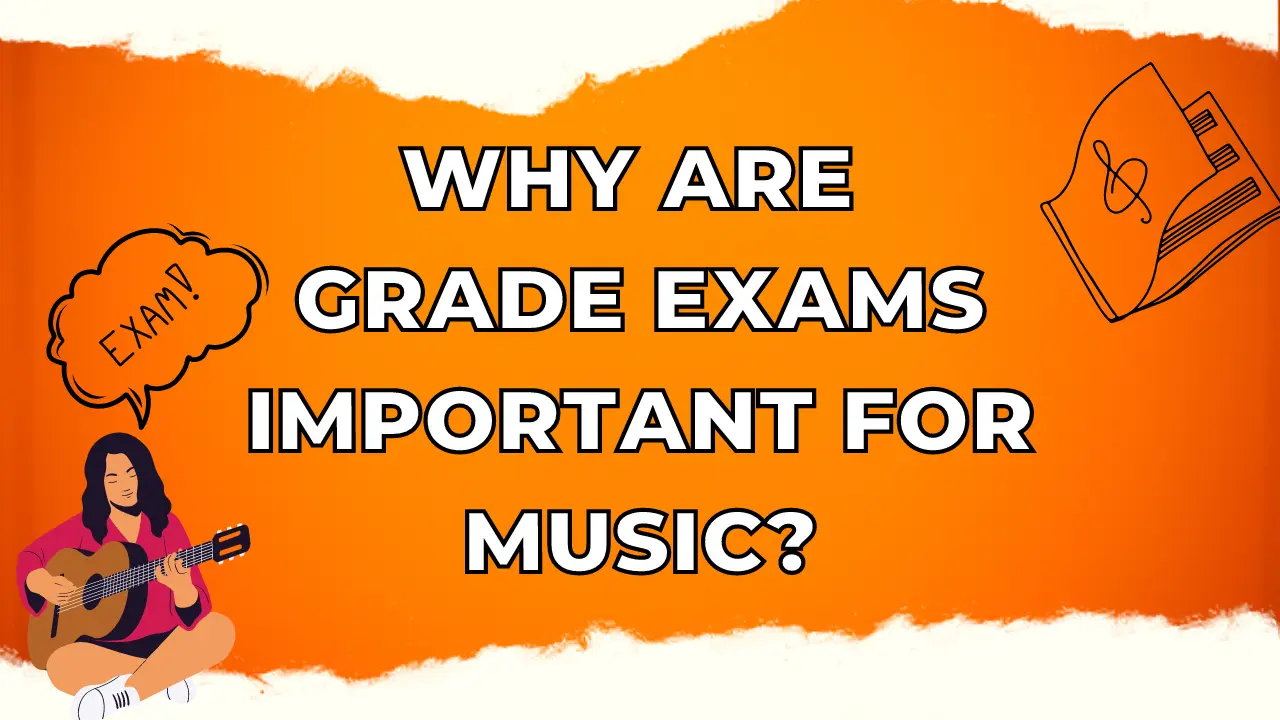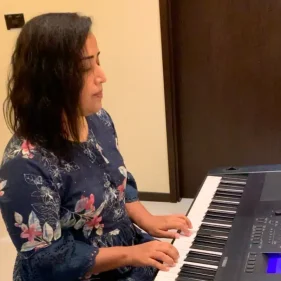- Assessment of Skills to Facilitates Improvement
- Music Grade Exams Provide a Structured Syllabus
- Builds Confidence and Helps Overcome Performance Anxiety.
- Certification for Validation
- Music Grade Exams Help you Create Strong Repertoire
- Music Grade Exams at MUSICMASTER
- How to Enroll for Music Grade Exams?
- Conclusion
- FAQs
For a number of reasons, Music Grade Exams are considered to be important in music education. Obviously, it showcases the growth of the learner. In this text we will thoroughly evaluate and review ABRSM music exams, Trinity music exams and other graded exams by reputed institutions.
Music grade exams, provided by reputable organizations such as Trinity College London or the Associated Board of the Royal Schools of Music (ABRSM) or Rockschool of Music, provide its learners with standards for evaluating their talent. identifying a person’s musical aptitude. These tests, which are divided into proficiency levels, are essential to music education since they provide a methodical way to acquire and assess musical abilities.

Music can name the unnameable and communicate the unknowable.” – Leonard Bernstein
Let’s discuss why music graded exams are so important!
First and foremost, it helps you assess your own skills and paves way for improvement.
Assessment of Skills to Facilitates Improvement
Music grade exams provide a systematic evaluation and assessment of your skills and expertise in the particular field of study. It also helps you understand your level of comprehension instrument or voice they have chosen. To me, that’s more important than to keep on learning but end up with little to no understanding on the subject matter.
And so, music grade exams like ABRSM music exams or Trinity music exams give you a thorough assessment based on your performances and ability to showcase your talent.you would be assessed on the basis of a number of strategies including technical proficiency, musical interpretation through musical exercises and sight-reading.
Music theory is usually covered in Music Grade Exams. Basic on these assessments, you can evaluate yourself and create your routine towards more improvement.
Music Grade Exams Provide a Structured Syllabus
Providing musicians with a systematic syllabus is one of the perks of taking up music grade exams. It helps you to define and accomplish goals. The level system builds inspiration in you to complete the entire levels and keeps you occupied with what to learn with necessary materials.
These Graded examinations syllabus and the level -specific goals increase the challenges that support your development greatly. Once you set the goal, lots of habits such as self-control, persistence , and determination that are beneficial in real life as well as in musical education.
Builds Confidence and Helps Overcome Performance Anxiety.
Most music learners don’t always have an objective. Music grade exams give objectives to achieve for a stipulated time. You have to put in a great deal of work to achieve these objectives with practice sessions and rehearsals. The classes and rehearsals build confidence in you. Continuous rehearsals will eventually help you overcome stage fright or the performance anxiety. This comes in handy when you start performing for audiences.
Certification for Validation
ABRSM music exams or Trinity music exams or rockschool music grade exams provide certificates that validate the effort of a music learner. I think this is a great way to keep the fire burning inside a learner.
These certificates provide students with concrete proof of their commitment, endurance, and musical ability, which also boosts their self-esteem. More importantly , passing grades on exams can help applicants to music schools, universities, and conservatories. This gives them a wide variety of opportunities to make a living out of Music.
Music Grade Exams Help you Create Strong Repertoire
Music grade exams syllabus vocals expose students to a wide variety of musical styles, genres, and composers from different eras. Students encounter more challenging material as they move through the grades with different technical approaches. You will develop the sense of musical interpretation by studying or playing works by many composers and musical eras.
You will also learn how to portray emotions, dynamics, phrasing, and nuance in their performances. Students’ artistic expression is enhanced and their relationship to the music they perform is strengthened via this musical interpretation process. Getting exposed to all the pieces in each level, you will have a strong and unique repertoire for yourself at the end of all the grades.
Students broaden their repertoire and get a greater comprehension of musical interpretation, expression, and style by studying and mastering these compositions.

Did You Know?
There is also a so-called “banjo-lele” (or “banjo-uke“), a hybrid of a banjo and a ukulele (as the name suggests) and it even turned 100 years old last year.
Music Grade Exams at MUSICMASTER
At MUSICMASTER, we provide our happy learners with opportunities to interact with music professionals ie., our tutors and experienced artists. Students participate in collective and individual learning activities that enhance their musical knowledge through attending workshops, masterclasses, exam preparation sessions, and recitals..
Along with these activities and music grade exams, we provide our learners an excellent chance to share their musical accomplishments with friends, family, and fellow learners..
We train learners for music grade exams in Piano, Guitar, Violin, Singing, Flute and Drums.
How to Enroll for Music Grade Exams?
1. Decide on which instrument or singing interests you. Once you decide on what you want to learn, find yourself a good tutor who makes your learning process worthwhile. Let me make that decision easy for you. Enroll with us today without further thinking!
2. Then, looking for organizations that provide music grading tests. Popular ones are the Trinity College London, and the Associated Board of the Royal Schools of Music (ABRSM) or Rockschool. Note that different institutions have syllabus and grading systems.
3. Begin from level 1 and work your way up to Level 8 and beyond. All the music grade exam boards give graded tests at every level, from basic (Grade 1) to advanced ie., graduate levels.
4. Now it is time to start preparing for the exam you wish to register for. Your tutor will guide you with everything. You need to practice and complete the syllabus.
5. With the help of your tutor determine which level of music grade exam you can opt for. This decision should solely be based on your ability to learn grasp and on the level of performance.
6. After having completed the syllabus you can register for music grade exams in their respective portals or by contacting your local center of exam.
7. Note that, both digital and offline exams are available. Let me leave the links of the official website’s links for your information.
Conclusion
Follow the pointers mentioned in this blog and Set out on a fulfilling path of musical growth and accomplishment. To enhance your test performance, never forget to be focused and dedicated to your practice and study. Happy Learning!
What makes a singer stand out immediately? Its their ability to sing on ‘Pitch‘
FAQs
What should I anticipate from a music grade exam?
You can anticipate getting assessed based on your technical skill, musicality, and theoretical knowledge by sight-reading, aural exams, and performing your pieces.
Ways to be ready for tests on music grades?
You need to be ready with lots of practice based on the feedback from your tutor.
Where can I find music grade exam syllabus theory?
You can find the music grade exam syllabus theory on any of the organization’s official websites.
What grades or levels are there in music exams?
There are 8 grades or levels in music grade exams. You can pursue a diploma after completing these 8 levels.
How can I study for my music grade examinations in an efficient manner?
The most efficient manner to study is with proper guidance from a professional.
Which subjects are included in tests for music grades?
Music grades exams can be given instruments like piano, violin, guitar, flute, drums, saxophone, trumpet, recorder, singing, musical theater.
Where can I get tools and study guides for music grade exams?
All of the materials are available in the books sold by the institutions.
Where can I find Music grade exams syllabus vocals?
You can find the music grade exam syllabus of vocals under singing on any of the organization’s official websites.


























